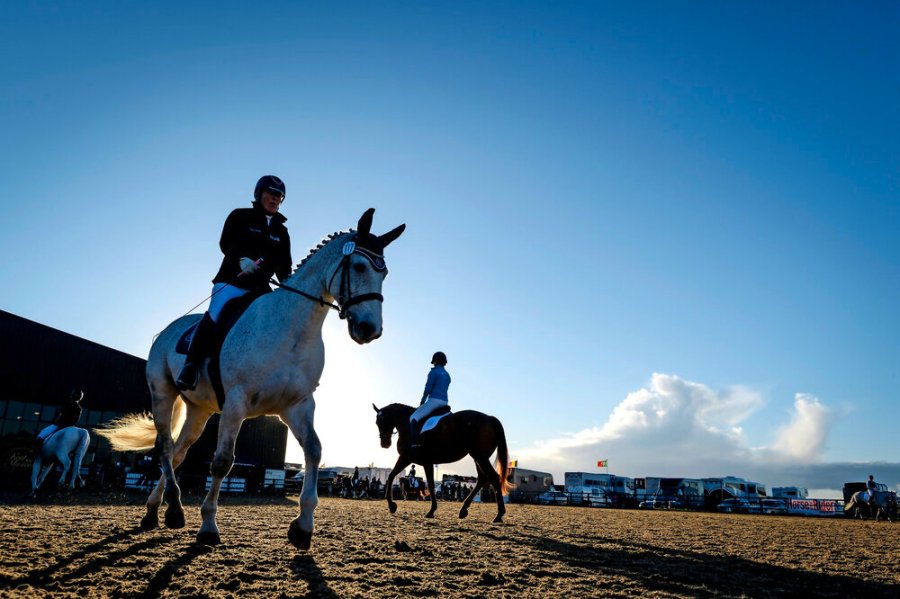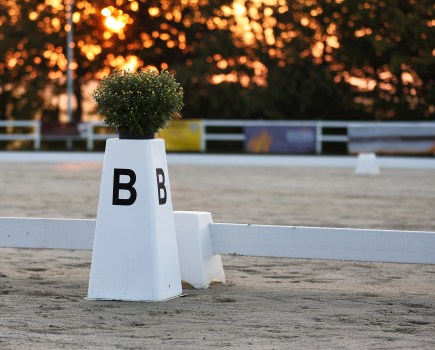Looking for a new dressage challenge, but nervous of stepping up to affiliated? Then My Quest or Team Quest could be the perfect solution for you.
Levels and categories
There are three levels that combinations can take part in (intro, prelim and novice) and two age categories (open and under 21), with competitions during a normal season running from December through to August.
Stephanie Verge, Quest officer for British Dressage, says: “We welcome everyone — anyone who’d like to join in the fun! Depending on your goals, you can join as an individual competing within My Quest, or join with friends as
a team and compete in Team Quest — or even try both. Riders just need to be eligible to compete in bronze sections at intro, prelim or novice, according to BD rules.”
Basically, as long as you’re registered as a minimum of a Club Member and your horse has a minimum of a Club registration, you’re good to go!
Teamwork makes the dream work
Louise Allen is the captain of Team Cogegoes, based in Cornwall. Along with her horse, Myrtle, and four other riders, she and her fellow squad members all have their sights firmly set on riding at the regionals.
“I have known my fellow team members, Nikki, Sue, Margaret and Emma, for many years,” says Louise. “We’d always wanted to form some sort of team — we even had the name ready — but we never found the right opportunity.
“When I was told about Quest, my initial questions were: ‘Can I do it? We’ve dabbled in some unaffiliated dressage… but perhaps my canter isn’t there yet.’
“Then I found out that the classes start at intro level. After that we threw ourselves into it and then came the sheer excitement of membership, dates and, of course, matching gear!”
In Team Quest competitions each team member rides their dressage test as an individual with the best three scores contributing to the overall team total.
Lucky seven
Each team can be made up of either three or four combinations, although you can register a maximum of seven riders to your team with an unlimited number of reserve horses.
“Individuals compete and gain points for their team which is then assigned onto the leaderboard,” explains Stephanie Verge.
“A minimum of three and a maximum of four combinations can compete on any one competition day for the team. At the end of the season, the top 15 teams will be invited to the regionals to compete for a place at the National Championship.”
So far Louise Allen and Team Cogegoes have enjoyed four outings, and Louise has also had a go at My Quest.
“The team has a great time, but it’s not all about what goes on in the arena,” says Louise. ”We regularly go for dinner together or out for tea, and we make picnics, so it’s a real social thing as well as being competitive.
“We’ve become closer, too, supporting each other — we’re always there for one another. I never thought that dressage could be so much fun. Fingers, toes and hooves crossed that we make it to the regionals.”
Riders taking part in Team Quest can also be part of multiple teams. If you’re riding two different horses on two different teams, you can compete at the same level, or if you’re riding the same horse on two different teams this must be at two different levels.
Horses can compete in up to two Team Quest tests per day, and can do a maximum of four tests a day, including My Quest tests.
A personal challenge
If you’d rather go solo, give My Quest a shot. This follows the same format as Team Quest, with qualifiers taking place at the same BD Quest shows, with the final target being the prestigious Kent & Masters My Quest Championship.
Points are earned in line with the percentage achieved at each show. You can compete at multiple levels — just remember, though, that your horse can only take part in a maximum of four tests a day.
Your five best My Quest scores count towards a place on one of eight regional leaderboards. The top 20 My Quest combinations on regional leaderboards (everyone is placed on a regional leaderboard based on their postcode) will be invited to attend a My Quest regional final to compete for a place at the National Championship. The top four from each of these eight finals will then progress to the My Quest National Championship.
How to qualify
There are eight regional finals — Central, Eastern, Northern, North West, Scotland, Southern, South West and Wales. Riders can choose which region they wish to compete in based on the regional final venue they wish to compete at should they qualify. There is a leaderboard for every region and, as you compete, you’ll move around the leaderboard.
The rider chooses the level at which they would like to begin, but it can be dependent on eligibility. There are eligibility tables for each level (intro, prelim and novice) and separate rules for Team Quest and My Quest (explained in detail in the Member’s Handbook).
While Britain is in the grip of coronavirus there will be no Quest contests, but there’s no reason why you can’t practise at home — provided you follow government guidelines — so that you’re ready when things return to normal.
Don’t miss the latest issue of Your Horse Magazine, jam-packed with training and veterinary advice, horse-care tips and the latest equestrian products, available now.









